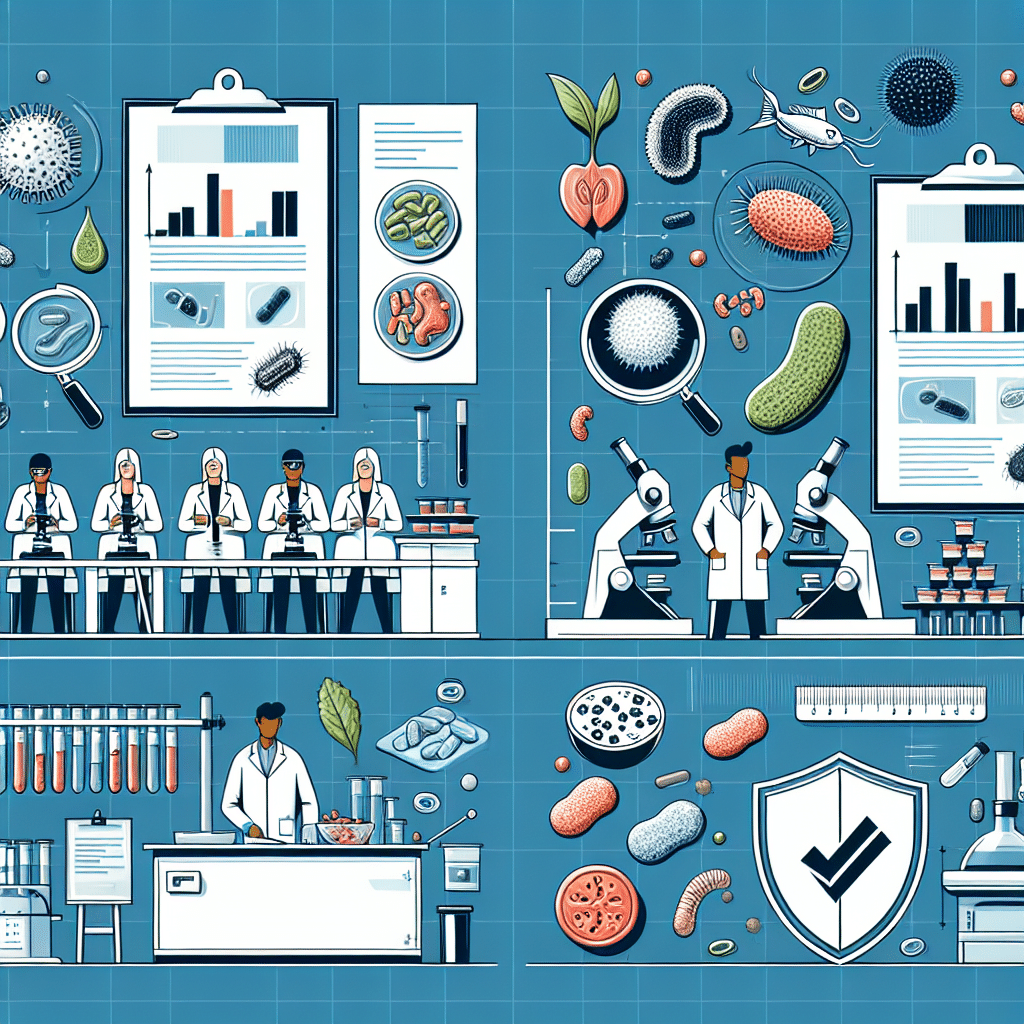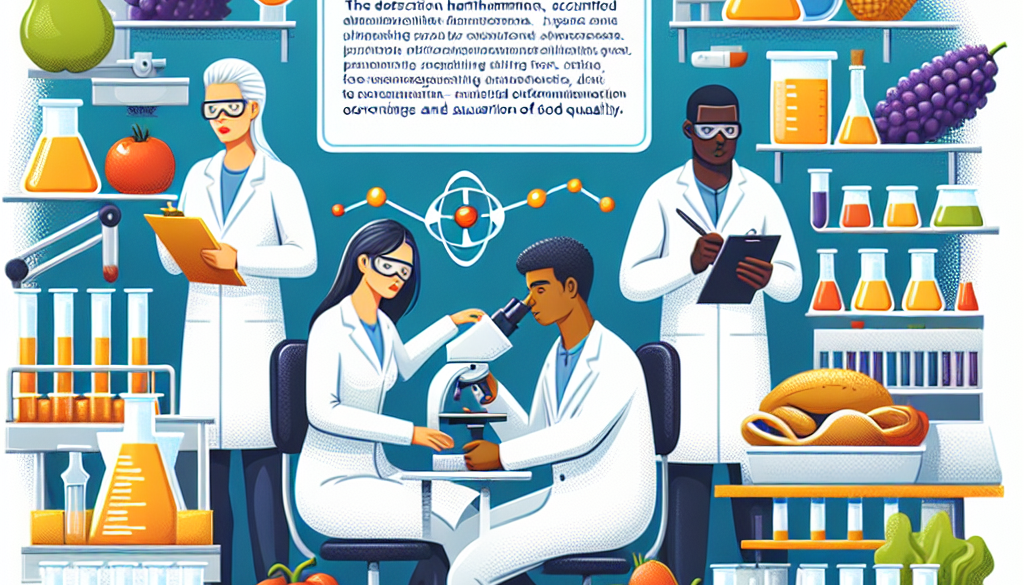What is the Purpose of Food Safety Testing?
-
Table of Contents
- Food Safety Testing: Ensuring the Integrity of Our Food Supply
- The Importance of Food Safety Testing
- Types of Food Safety Testing
- Statistics Highlighting the Need for Food Safety Testing
- Advancements in Food Safety Testing Technologies
- Challenges in Food Safety Testing
- Conclusion: The Critical Role of Food Safety Testing
- ETprotein: High-Quality Protein Products You Can Trust
Food Safety Testing: Ensuring the Integrity of Our Food Supply

Food safety testing is a critical component of the global food supply chain. Its primary purpose is to ensure that the food we consume is free from contaminants and safe for human consumption. This process involves a series of analyses conducted on food products to detect harmful substances such as pathogens, chemicals, and physical hazards. The importance of food safety testing cannot be overstated, as it plays a vital role in preventing foodborne illnesses, protecting public health, and maintaining consumer confidence in food products.
The Importance of Food Safety Testing
Food safety testing serves several essential functions in the food industry:
- Preventing Foodborne Illnesses: By detecting pathogens like Salmonella, E. coli, and Listeria, food safety testing helps prevent outbreaks of foodborne diseases that can lead to severe health issues or even fatalities.
- Compliance with Regulations: Food producers must adhere to strict safety standards set by regulatory bodies such as the FDA and USDA. Regular testing ensures compliance and helps avoid legal repercussions and recalls.
- Quality Assurance: Testing helps maintain the quality of food products by identifying spoilage organisms and ensuring that the food’s nutritional value remains intact.
- Consumer Trust: When consumers are confident that the food they purchase is safe, they are more likely to trust and remain loyal to a brand.
Types of Food Safety Testing
Food safety testing encompasses various methods and technologies to detect different types of hazards:
- Microbiological Testing: This type of testing looks for harmful bacteria, viruses, and parasites that can cause illness.
- Chemical Testing: Chemical analyses detect residues from pesticides, toxins, and other harmful compounds.
- Physical Testing: Physical tests identify foreign objects in food, such as metal shards or plastic pieces.
- Allergen Testing: Allergen tests are crucial for people with food allergies, as they detect the presence of allergenic substances like nuts, gluten, and dairy.
Statistics Highlighting the Need for Food Safety Testing
Recent statistics underscore the critical need for rigorous food safety testing:
- According to the Centers for Disease Control and Prevention (CDC), an estimated 48 million people get sick, 128,000 are hospitalized, and 3,000 die from foodborne diseases each year in the United States alone.
- The World Health Organization (WHO) reports that almost 1 in 10 people fall ill every year from eating contaminated food, with 420,000 dying as a result.
- A study by the Grocery Manufacturers Association (GMA) found that food recalls due to contamination can cost a company an average of $10 million in direct costs alone, not including brand damage and lost sales.
Advancements in Food Safety Testing Technologies
Technological advancements have significantly improved the efficiency and accuracy of food safety testing:
- Rapid Testing Methods: Techniques such as polymerase chain reaction (PCR) and enzyme-linked immunosorbent assay (ELISA) provide quicker results than traditional culturing methods.
- Whole Genome Sequencing: This technology allows for the precise identification of pathogens, which can help trace outbreaks back to their source.
- Portable Testing Devices: New portable devices enable on-site testing, reducing the time it takes to get results and take action if necessary.
Challenges in Food Safety Testing
Despite its importance, food safety testing faces several challenges:
- Global Supply Chain Complexity: As food supply chains become more globalized, ensuring the safety of imported foods is increasingly challenging.
- Emerging Contaminants: New contaminants and antibiotic-resistant strains of bacteria present ongoing challenges for food safety testing.
- Cost and Resource Limitations: Small-scale producers may struggle with the costs associated with comprehensive testing programs.
Conclusion: The Critical Role of Food Safety Testing
In conclusion, food safety testing is an indispensable part of the food industry. It safeguards public health, ensures compliance with regulations, maintains product quality, and upholds consumer trust. As the food supply chain becomes more complex and new threats emerge, the role of food safety testing will only grow in importance. Continuous advancements in testing technologies and methodologies are essential to meet these challenges and protect consumers worldwide.
ETprotein: High-Quality Protein Products You Can Trust
When it comes to food safety, the quality of ingredients is paramount. ETprotein is a company that understands the importance of providing safe, high-quality protein products. Their extensive range of organic bulk vegan proteins and L-(+)-Ergothioneine (EGT) is produced with the highest standards of safety and quality in mind. Whether you’re in the food and beverage industry, sports nutrition, or health and wellness, ETprotein’s products are tested and trusted, ensuring that you can offer your customers the best without compromising on safety.
About ETprotein:
ETprotein, a reputable protein and L-(+)-Ergothioneine (EGT) Chinese factory manufacturer and supplier, is renowned for producing, stocking, exporting, and delivering the highest quality organic bulk vegan proteins and L-(+)-Ergothioneine. They include Organic rice protein, clear rice protein, pea protein, clear pea protein, watermelon seed protein, pumpkin seed protein, sunflower seed protein, mung bean protein, peanut protein, and L-(+)-Ergothioneine EGT Pharmaceutical grade, L-(+)-Ergothioneine EGT food grade, L-(+)-Ergothioneine EGT cosmetic grade, L-(+)-Ergothioneine EGT reference grade and L-(+)-Ergothioneine EGT standard. Their offerings, characterized by a neutral taste, non-GMO, allergen-free attributes, with L-(+)-Ergothioneine purity over 98%, 99%, cater to a diverse range of industries. They serve nutraceutical, pharmaceutical, cosmeceutical, veterinary, as well as food and beverage finished product distributors, traders, and manufacturers across Europe, USA, Canada, Australia, Thailand, Japan, Korea, Brazil, and Chile, among others.
ETprotein specialization includes exporting and delivering tailor-made protein powder and finished nutritional supplements. Their extensive product range covers sectors like Food and Beverage, Sports Nutrition, Weight Management, Dietary Supplements, Health and Wellness Products, and Infant Formula, ensuring comprehensive solutions to meet all your protein needs.
As a trusted company by leading global food and beverage brands and Fortune 500 companies, ETprotein reinforces China’s reputation in the global arena. For more information or to sample their products, please contact them and email sales(at)ETprotein.com today.












